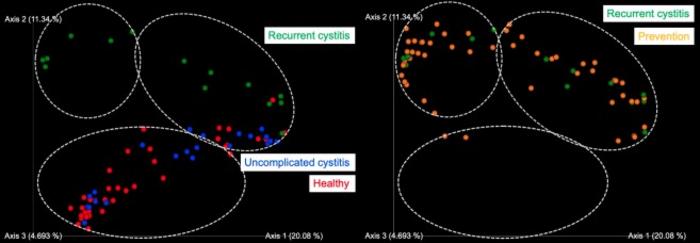Recurrent cystitis (RC) is a frequent infection of the urinary tract and bladder, which is highly prevalent among postmenopausal women. Under healthy circumstances, the human vagina is home to a host of beneficial intestinal bacteria, such as Lactobacilli. However, in the case of urinary tract infections (UTIs), there is a decrease in the abundance of Lactobacilli and an increase in pathogenic bacteria, such as Escherichia coli (E. coli).

Credit: Takanori Sekito from Okayama University
Recurrent cystitis (RC) is a frequent infection of the urinary tract and bladder, which is highly prevalent among postmenopausal women. Under healthy circumstances, the human vagina is home to a host of beneficial intestinal bacteria, such as Lactobacilli. However, in the case of urinary tract infections (UTIs), there is a decrease in the abundance of Lactobacilli and an increase in pathogenic bacteria, such as Escherichia coli (E. coli).
Previous studies have shown that changes in vaginal microbiota are a key underlying reason for the development of UTIs. Further, a few clinical trials have demonstrated the utility of Lactobacillus-containing vaginal suppositories in the prevention of RC. It is unknown whether women who have undergone menopause (which is known to be accompanied by a change in the vaginal microbiota) derive benefits from these suppositories. However, there is a lack of studies comparing the vaginal microbiota in postmenopausal women with RC and uncomplicated cystitis to that of healthy postmenopausal women, as well as changes in the vaginal microbiota prior to and during intervention with Lactobacillus-containing vaginal suppositories with RC.
To bridge this gap, a team of scientists from Okayama University, Japan, demonstrated the relationship between vaginal microbiota and RC by comparing the vaginal microbiota of postmenopausal women with and without cystitis. The team also investigated the relative abundance of different bacterial species in the vagina, before and after the administration of vaginal suppositories containing Lactobacillus crispatus, which was previously developed by the team, to study the therapeutic effect of Lactobacillus in this target demographic.
The research was spearheaded by Mr. Takanori Sekito along with Dr. Takuya Sadahira and Dr. Motoo Araki from the Department of Urology at Okayama University Graduate School of Medicine, Dentistry, and Pharmaceutical Science. The team also included Dr. Shuta Tomida from the Center for Comprehensive Genomic Medicine, Okayama University Hospital. The study was published in Volume 14 of the journal Frontiers in Microbiology on 18 May 2023.
The team used 16S ribosomal ribonucleic acid (rRNA)-based gene sequencing to analyze the bacterial community present in the vaginal samples from healthy postmenopausal women, those with RC, those with uncomplicated cystitis, and those who received Lactobacillus crispatus-containing vaginal suppositories for RC prevention. They found that the bacterial species present in the healthy and uncomplicated cystitis groups were significantly different, even though the uncomplicated cystitis group and the healthy group showed apparent similarities in their respective bacterial communities . Further, the microbiomes of the uncomplicated cystitis and healthy groups were also vastly different from those of the RC group.
When comparing the vaginal microbiome in the RC and the prevention group, while a few similarities in the diversity of bacterial species, their relative abundance differed between the two groups. The team didn’t find any Lactobacilli in the vaginal samples of postmenopausal patients with RC. Instead, the dominant species were various members of the Enterobacteriaceae family, which includes many uropathogenic bacteria. This is in stark contrast to healthy vaginal microbiota, which is rich in healthy intestinal bacteria like Lactobacilli. Notably, the relative abundance of Lactobacilli in the RC-prevention group was much higher (19%) than in the RC group, due to the suppository.
“We found that the vaginal microbiota in postmenopausal women with recurrent cystitis is essentially different from that in postmenopausal women with uncomplicated cystitis or healthy women ”, remarks Mr. Sekito. The study shows that RC occurs when Lactobacilli, a critical member of the healthy vaginal microbiota, are depleted and replaced by pathogenic bacteria, like E. coli. Current treatment for RC involves anti-microbial agents, which are prone to antibiotic resistance. This research suggests an alternative therapeutic avenue in the form of vaginal suppositories containing Lactobacilli that can help reduce the imbalance in vaginal microbiota, and in turn reduce RC occurrence.
Further, the frequent use of antimicrobials in cases of recurring infections can even lead to severe forms cystitis, which are even more difficult to treat. “The Lactobacillus vaginal suppositories have the potential to be a new preventive method to help the numerous people suffering from recurrent cystitis, which cannot be adequately cured by taking antimicrobials ,” Mr. Sekito concludes.
Journal
Frontiers in Microbiology
DOI
10.3389/fmicb.2023.1187479
Method of Research
Observational study
Subject of Research
People
Article Title
Etiology of recurrent cystitis in postmenopausal women based on vaginal microbiota and the role of Lactobacillus vaginal suppository
Article Publication Date
18-May-2023
COI Statement
The authors declare that the research was conducted in the absence of any commercial or financial relationships that could be construed as a potential conflict of interest.




